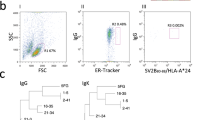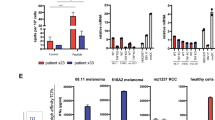Abstract
Peptide vaccine based on tumor-associated antigen (TAA), which usually belongs to self-antigen with poor immunogenicity, has been considered as an attractive option for treatment of malignant tumors. The ideal TAA epitopes should have stable affinity to major histocompatibility complex (MHC) molecules and elicit strong anti-tumor immune response. Although point-mutation technology of TAA peptide may increase the binding capability to MHC molecules, some previous studies have revealed that part of the variant peptides results in lymphocyte not to effectively cross-recognize and kill the target tumor expressed wild-type TAA. Here, we designed a novel HLA-A2-restricted mutated TAA Survivin epitope nonapeptide Sur79L2 (KLSSGCAFL) that showed higher binding ability compared to wild-type peptide Sur79 (KHSSGCAFL) in T2-binding assays. To investigate whether Sur79L2 can induce Survivin-specific anti-hepatocellular carcinoma (HCC) response, we stimulated tumor-associated lymphocytes from a HCC patient with Sur79L2 in vitro. IFN-γ release and cytotoxicity assays showed Sur79L2 could effectively cross-recognize and lysis T2 cell plus peptide Sur79 and HCC cell lines (expression of wild-type Survivin antigen) in an HLA-A2-restricted manner. In contrast, peptide Sur95 (ELTLGEFLKL) that has been reported as a very promising anti-tumor epitope in a variety of tumors except HCC were not able to generate detectable cytotoxic immune responses against HCC in this study. Our results suggest that point-mutated peptide Sur79L2 is a new HLA-A2-restricted CTL epitope and may be useful for the immunotherapy for patients with HCC.





Similar content being viewed by others
References
Finn RS (2010) Development of molecularly targeted therapies in hepatocellular carcinoma: where do we go now? Clin Cancer Res 16:390–397
Klebanoff CA, Acquavella N, Yu Z, Restifo NP (2011) Therapeutic cancer vaccines: are we there yet? Immunol Rev 239:27–44
Palucka K, Ueno H, Banchereau J (2011) Recent developments in cancer vaccines. J Immunol 186:1325–1331
Zerbini A, Pilli M, Soliani P, Ziegler S, Pelosi G, Orlandini A, Cavallo C, Uggeri J, Scandroglio R, Crafa P, Spagnoli GC, Ferrari C, Missale G (2004) Ex vivo characterization of tumor-derived melanoma antigen encoding gene-specific CD8 + cells in patients with hepatocellular carcinoma. J Hepatol 40:102–109
Shang XY, Chen HS, Zhang HG, Pang XW, Qiao H, Peng JR, Qin LL, Fei R, Mei MH, Leng XS, Gnjatic S, Ritter G, Simpson AJ, Old LJ, Chen WF (2004) The spontaneous CD8 + T-cell response to HLA-A2-restricted NY-ESO-1b peptide in hepatocellular carcinoma patients. Clin Cancer Res 10:6946–6955
Butterfield LH, Ribas A, Dissette VB, Lee Y, Yang JQ, De la Rocha P, Duran SD, Hernandez J, Seja E, Potter DM, McBride WH, Finn R, Glaspy JA, Economou JS (2006) A phase I/II trial testing immunization of hepatocellular carcinoma patients with dendritic cells pulsed with four alpha-fetoprotein peptides. Clin Cancer Res 12:2817–2825
Sah NK, Khan Z, Khan GJ, Bisen PS (2006) Structural, functional and therapeutic biology of survivin. Cancer Lett 244:164–171
Yamamoto H, Ngan CY, Monden M (2008) Cancer cells survive with surviving. Cancer Sci 99:1709–1714
Mamori S, Asakura T, Ohkawa K, Tajiri H (2007) Survivin expression in early hepatocellular carcinoma and post-treatment with anti-cancer drug under hypoxic culture condition. World J Gastroenterol 13:5306–5311
Tsuruma T, Iwayama Y, Ohmura T, Katsuramaki T, Hata F, Furuhata T, Yamaguchi K, Kimura Y, Torigoe T, Toyota N, Yagihashi A, Hirohashi Y, Asanuma H, Shimozawa K, Okazaki M, Mizushima Y, Nomura N, Sato N, Hirata K (2008) Clinical and immunological evaluation of anti-apoptosis protein, survivin-derived peptide vaccine in phase I clinical study for patients with advanced or recurrent breast cancer. J Transl Med 6:24
Kameshima H, Tsuruma T, Torigoe T, Takahashi A, Hirohashi Y, Tamura Y, Tsukahara T, Ichimiya S, Kanaseki T, Iwayama Y, Sato N, Hirata K (2011) Immunogenic enhancement and clinical effect by type-I interferon of anti-apoptotic protein, survivin-derived peptide vaccine, in advanced colorectal cancer patients. Cancer Sci 102:1181–1187
Honma I, Kitamura H, Torigoe T, Takahashi A, Tanaka T, Sato E, Hirohashi Y, Masumori N, Tsukamoto T, Sato N (2009) Phase I clinical study of anti-apoptosis protein survivin-derived peptide vaccination for patients with advanced or recurrent urothelial cancer. Cancer Immunol Immunother 58:1801–1807
Andersen MH, Pedersen LO, Capeller B, Bröcker EB, Becker JC, thor Straten P (2001) Spontaneous cytotoxic T-cell responses against survivin-derived MHC class I-restricted T-cell epitopes in situ as well as ex vivo in cancer patients. Cancer Res 61:5964–5968
Casati C, Dalerba P, Rivoltini L, Gallino G, Deho P, Rini F, Belli F, Mezzanzanica D, Costa A, Andreola S, Leo E, Parmiani G, Castelli C (2003) The apoptosis inhibitor protein survivin induces tumor-specific CD8 + and CD4 + T cells in colorectal cancer patients. Cancer Res 63:4507–4515
Yu Z, Theoret MR, Touloukian CE, Surman DR, Garman SC, Feigenbaum L, Baxter TK, Baker BM, Restifo NP (2004) Poor immunogenicity of a self/tumor antigen derives from peptide-MHC-I instability and is independent of tolerance. J Clin Invest 114:551–559
McMahan RH, McWilliams JA, Jordan KR, Dow SW, Wilson DB, Slansky JE (2006) Relating TCR-peptide-MHC affinity to immunogenicity for the design of tumor vaccines. J Clin Invest 116:2543–2551
Rizzuto GA, Merghoub T, Hirschhorn-Cymerman D, Liu C, Lesokhin AM, Sahawneh D, Zhong H, Panageas KS, Perales MA, Altan-Bonnet G, Wolchok JD, Houghton AN (2009) Self-antigen-specific CD8 + T cell precursor frequency determines the quality of the antitumor immune response. J Exp Med 206:849–866
Jordan KR, McMahan RH, Kemmler CB, Kappler JW, Slansky JE (2010) Peptide vaccines prevent tumor growth by activating T cells that respond to native tumor antigens. Proc Natl Acad Sci USA 107:4652–4657
Andersen MH, Pedersen LO, Becker JC, Straten PT (2001) Identification of a cytotoxic T lymphocyte response to the apoptosis inhibitor protein survivin in cancer patients. Cancer Res 61:869–872
Butterfield LH (2007) Recent advances in immunotherapy for hepatocellular cancer. Swiss Med Wkly 137:83–90
Colella TA, Bullock TN, Russell LB, Mullins DW, Overwijk WW, Luckey CJ, Pierce RA, Restifo NP, Engelhard VH (2000) Self-tolerance to the murine homologue of a tyrosinase-derived melanoma antigen: implications for tumor immunotherapy. J Exp Med 91:1221–1232
McWilliams JA, Sullivan RT, Jordan KR, McMahan RH, Kemmler CB, McDuffie M, Slansky JE (2008) Age-dependent tolerance to an endogenous tumor-associated antigen. Vaccine 26:1863–1873
Idenoue S, Hirohashi Y, Torigoe T, Sato Y, Tamura Y, Hariu H, Yamamoto M, Kurotaki T, Tsuruma T, Asanuma H, Kanaseki T, Ikeda H, Kashiwagi K, Okazaki M, Sasaki K, Sato T, Ohmura T, Hata F, Yamaguchi K, Hirata K, Sato N (2005) A potent immunogenic general cancer vaccine that targets survivin, an inhibitor of apoptosis proteins. Clin Cancer Res 11:1474–1482
Wobser M, Keikavoussi P, Kunzmann V, Weininger M, Andersen MH, Becker JC (2006) Complete remission of liver metastasis of pancreatic cancer under vaccination with a HLA-A2 restricted peptide derived from the universal tumor antigen surviving. Cancer Immunol Immunother 55:1294–1298
Fuessel S, Meye A, Schmitz M, Zastrow S, Linné C, Richter K, Löbel B, Hakenberg OW, Hoelig K, Rieber EP, Wirth MP (2006) Vaccination of hormone-refractory prostate cancer patients with peptide cocktail-loaded dendritic cells: results of a phase I clinical trial. Prostate 66:811–821
Sun YC, Shen J, Shen, H, Shao HW, Huang SL (2007) Study of Survivin gene cloning and HLA-A2-restricted CTL epitope prediction in Hela cell line. Chin J Immunol 23:1044–1051 (Chinese)
Bachinsky MM, Guillen DE, Patel SR, Singleton J, Chen C, Soltis DA, Tussey LG (2005) Mapping and binding analysis of peptides derived from the tumor-associated antigen survivin for eight HLA alleles. Cancer Immun 5:6
Preta G, Marescotti D, Fortini C, Carcoforo P, Castelli C, Masucci M, Gavioli R (2008) Inhibition of serine-peptidase activity enhances the generation of a survivin-derived HLA-A2-presented CTL epitope in colon-carcinoma cells. Scand J Immunol 68:579–588
Morgan RA, Dudley ME, Wunderlich JR, Hughes MS, Yang JC, Sherry RM, Royal RE, Topalian SL, Kammula US, Restifo NP, Zheng Z, Nahvi A, de Vries CR, Rogers-Freezer LJ, Mavroukakis SA, Rosenberg SA (2006) Cancer regression in patients after transfer of genetically engineered lymphocytes. Science 314:126–129
Coccoris M, Straetemans T, Govers C, Lamers C, Sleijfer S, Debets R (2010) T cell receptor (TCR) gene therapy to treat melanoma: lessons from clinical and preclinical studies. Expert Opin Biol Ther 10:547–562
Acknowledgments
The authors thank Dr. Yu Liu of Wuhan University for her helpful reviews and suggestions. This work was supported by the National Major Projects of Science and Technology of China (No. 2009ZX09103-708), National Natural Science Foundation of China (No. 31100664) and Natural Science Foundation of Guangdong Province (No. 10151022401000024).
Conflict of interest
The authors declare that they have no conflict of interest.
Author information
Authors and Affiliations
Corresponding author
Electronic supplementary material
Below is the link to the electronic supplementary material.
Rights and permissions
About this article
Cite this article
Shen, H., Shao, HW., Chen, XH. et al. Identification of a novel HLA-A2-restricted mutated Survivin epitope and induction of specific anti-HCC CTLs that could effectively cross-recognize wild-type Survivin antigen. Cancer Immunol Immunother 62, 393–403 (2013). https://doi.org/10.1007/s00262-012-1323-4
Received:
Accepted:
Published:
Issue Date:
DOI: https://doi.org/10.1007/s00262-012-1323-4




